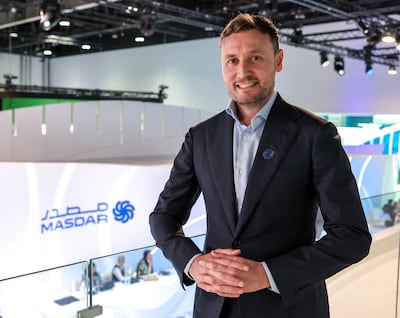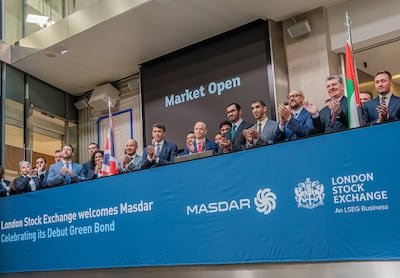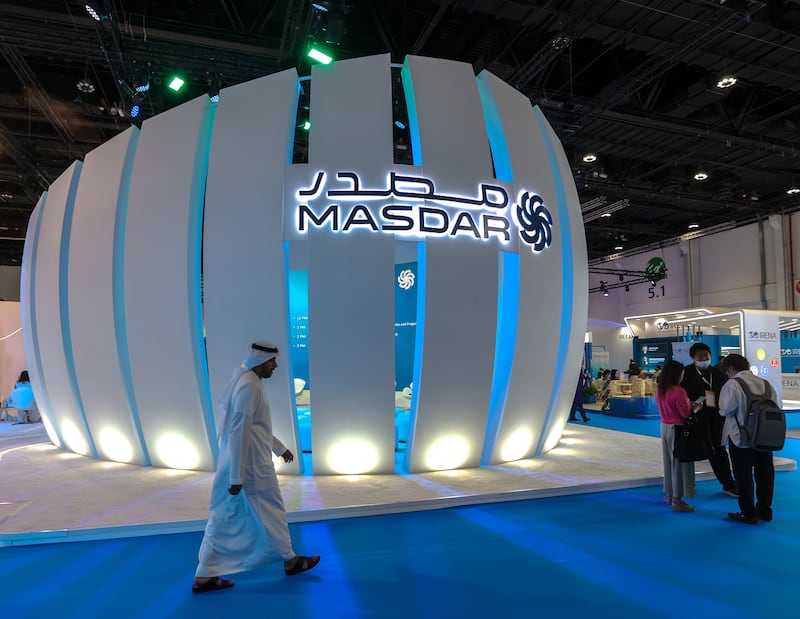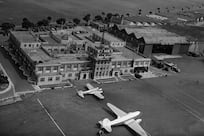Abu Dhabi clean energy company Masdar plans to raise between $750 million and $1 billion through the sale of a green bond this year as it looks to fund its renewable projects globally, a senior executive has said.
This will be the second green bond offering from the company after it raised $750 million last year and listed it on the London Stock Exchange and the Abu Dhabi Securities Exchange as part of a $3 billion bonds programme to finance clean energy projects in the UAE and other countries.
“The reason why you can expect that we will do another issuance this year, and in future years, is because we have a very strong pipeline of new greenfield projects around the world,” Bruce Johnson, director of corporate finance and treasury at Masdar, told The National on the sidelines of the World Future Energy Summit in Abu Dhabi on Wednesday.
“These projects are at an advanced stage of development and we are committed to meeting their equity funding needs with the proceeds of our green bonds.”
Masdar aims to fund projects in Central Asia – including in Uzbekistan and Azerbaijan – with the money raised through the new issuance.
It expects a strong investor demand for the green bond as green transition efforts accelerate globally amid net-zero goals to protect the environment.
The green bond issued by the company last year was oversubscribed 5.6 times, with the order book peaking at $4.2 billion.

“I am confident in our continued success and in another strong reception from debt capital markets’ investors because Masdar is one of the strongest credits in the region and because every single dollar of green bond is going towards new greenfield projects, many of which are in developing countries,” Mr Johnson said.
“These projects have a measurable positive impact on not only the environment but on the local communities which they serve, and these are things which are increasingly sought after by investors.”
The market for green and sustainable bonds and sukuk is booming, particularly in the GCC as governments in the oil-rich economic bloc push to meet their net-zero commitments.
Last year, UAE-based companies such as Aldar Properties, Abu Dhabi Islamic Bank and Abu Dhabi Commercial Bank raised money through the issuance of green bonds.
Saudi Arabia’s Public Investment Fund has also raised $5.5 billion through the sale of a green bond to secure funding to finance or refinance its green investments.
Masdar, jointly owned by the Abu Dhabi National Energy Company, better known as Taqa, Adnoc and Mubadala, is active in 40 countries. It aims to expand its capacity to at least 100 gigawatts of renewable energy by the end of the decade.
The company is looking for acquisition opportunities in Europe as it looks to grow its portfolio and boost its renewable capacity.
“Europe, including western and southern Europe, are jurisdictions where we are very alive to M&A opportunities, and it is likely that those M&A transactions that we execute will be relatively sizeable in nature,” Mr Johnson said, without elaborating further.

Earlier this year, Masdar completed the acquisition of a 49 per cent stake in three-gigawatt Dogger Bank South project, one of the world’s largest planned offshore wind farms.
The acquisition is part of an £11 billion ($14 billion) joint investment in the UK’s renewable energy sector with German company RWE, which retains a 51 per cent stake.
Last month, Masdar also agreed to acquire a 50 per cent stake in US renewable energy power producer Terra-Gen from New Jersey-based Energy Capital Partners. The move will allow Masdar to grow its clean energy portfolio in the world's largest economy.
The company is also looking at opportunities in the Mena region, including Jordan, Morocco and Egypt, Mr Johnson said.
“We continue to be very active in developing new projects in the Mena region, as well as elsewhere, and the company is well on its way to achieve the target of 100 gigawatts of capacity by 2030 as it grows its portfolio through new projects and acquisitions,” he said.
Meanwhile, Masdar has no immediate plans for an initial public offering, “but we are certainly looking to do everything we can to ensure IPO readiness, which means continuously improving to meet the high standards expected of us”, Mr Johnson said.







